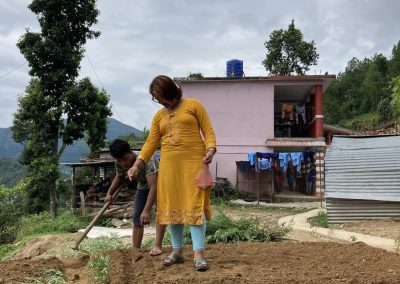MOTHER SISTER PROJECT
Mother Sister Nepal is an NGO founded by Meena Thapa and focused on the development and empowerment of women in small and agricultural communities.
The members share the challenges they face in their community and offer solutions and insights that can bring about in order to change in a sustainable way the lives of women and girls.
Why this NGO Exist?
In 2015 a strong earthquake struck Kathmandu and the central Nepal region, in particular the Sindhupalchok district.
The earthquake produced landslides that devastated rural villages; the delivery of relief services to the people in need during the first few days after the tragedy occurred, however, it was complicated by the remoteness of many villages from the existing transportation network, congestion at Kathmandu’s international airport, and a shortage of heavy trucks, helicopters, and other vehicles capable of transporting supplies.
The year following the earthquakes that devastated Nepal saw a spike in desperate people falling into the clutches of human traffickers.
Thousands of Nepali children are trafficked into India every year to work in prostitution and as child laborers, and the situation may worsen as traffickers target newly vulnerable children and families following the earthquakes.
Families may also be more easily persuaded to send their children to orphanages in Nepal, putting them at risk of poorly regulated adoption, exploitation and abuse.
Meena Thapa, the founder, while helping the population affected by the earthquake noticed this was already happening and decided to use her NGO to create a new project, entirely focused on the children of the area: she decided to build an orphanage to rescue as many children as possible, providing them with food and education.
She wanted to give them a right present and a promising future.
The orphanage today
The orphanage today hosts 30 children between the ages of 3 and 18. The aim is to accompany them through school and, once they have finished their compulsory education, to teach them how to enter society.
In order to do so, the children follow a routine and a set of rules:
They wake up at 6 and do their school homework
From 10 a.m. to 4 p.m. they go to school at the Sindhupalchok district school,
From 4 p.m. to 8 p.m. the older children help in the Meena family farm, learning the farmer’s profession, while the younger children play, do their homework or help prepare dinner
At 9 p.m. they have dinner and can watch TV for an hour.
At 10pm they go to sleep.
Aiselukharka School
The Aiselukharka school brings together more than 400 students from the surrounding area. It enables all children from this predominantly rural area to receive the compulsory education stipulated by the country. In addition, in the past few years the school has been running an agriculture and technology programme so that the younger generation can bring the family economy to a better level.
The farm
The farm is owned by Meena’s brother. It is a project designed to help the children at the orphanage to learn a job and to support the Sindhupalchok district economically after the earthquake.
In the farm, cows, sheep and chickens are raised and corn, soy and indigenous vegetables are cultivated.
Aim of this programme
The NGO Mother Sister has no permanent donors and all funds come directly from Meena, her family and friends, and people who do (short) periods of voluntary work at the facility. This means that at certain times of the year there are moments of crisis due to lack of money, so the aim of this project is to help with the monthly maintenance of the orphanage.
Maintenance of the orphanage
The orphanage has to support a total amount of expenses of about 00 each month, which includes several kinds of charges, the main ones are:
– Food – $ 1250
– Clothing – $ 195
– Gas, electricity and internet – $ 150
– School equipment – $ 80
Meraki’s idea is to focus on the first point, ensuring that the children always have food.
Rice is the main source of nutrition as the children eat it twice a day with vegetables and dhaal (broth and lentils).
This project wants to ensure a fixed income of 500 per month in order to guarantee these 3 basic goods.






